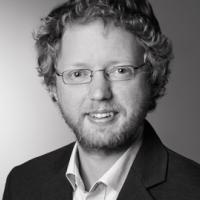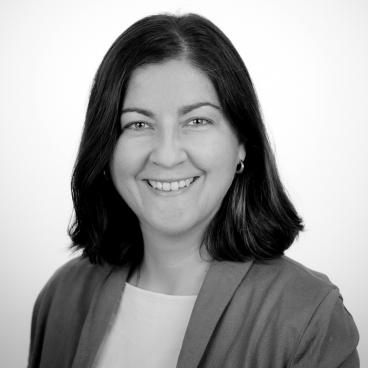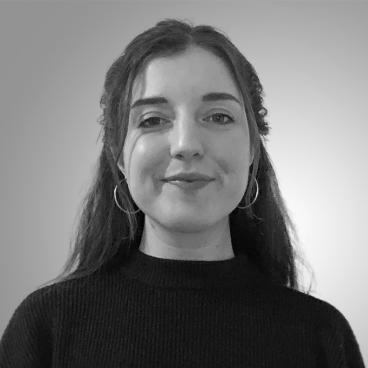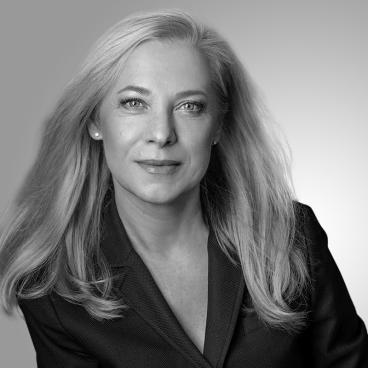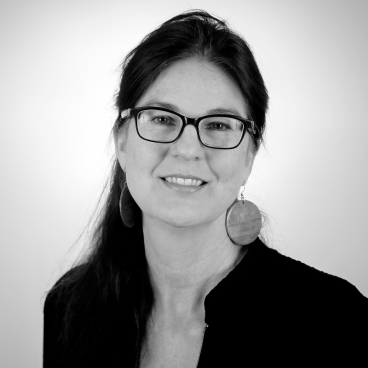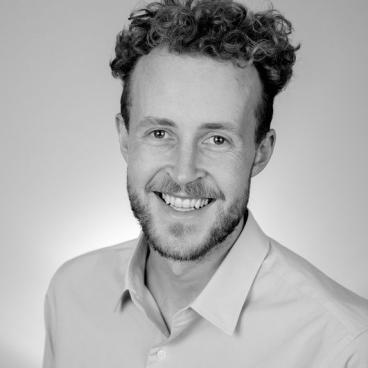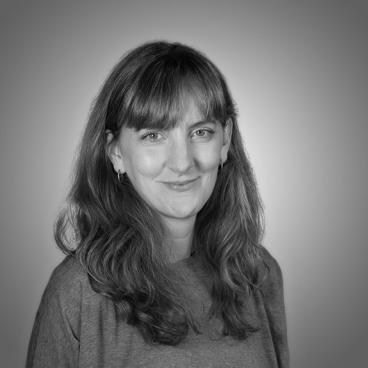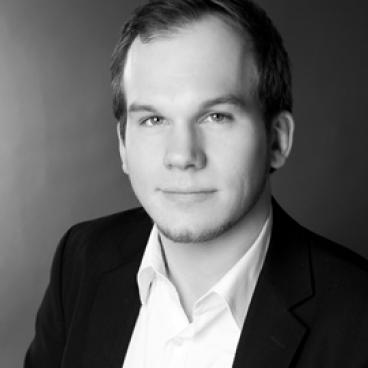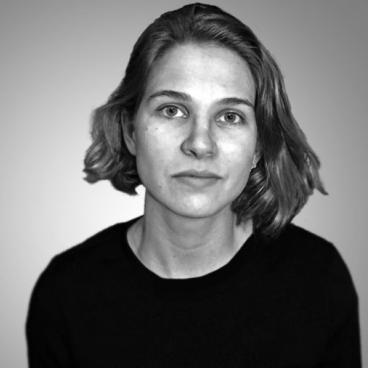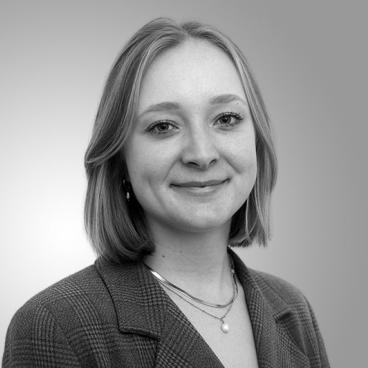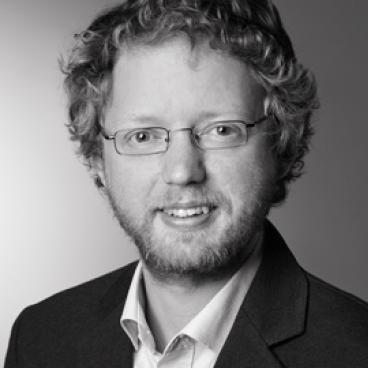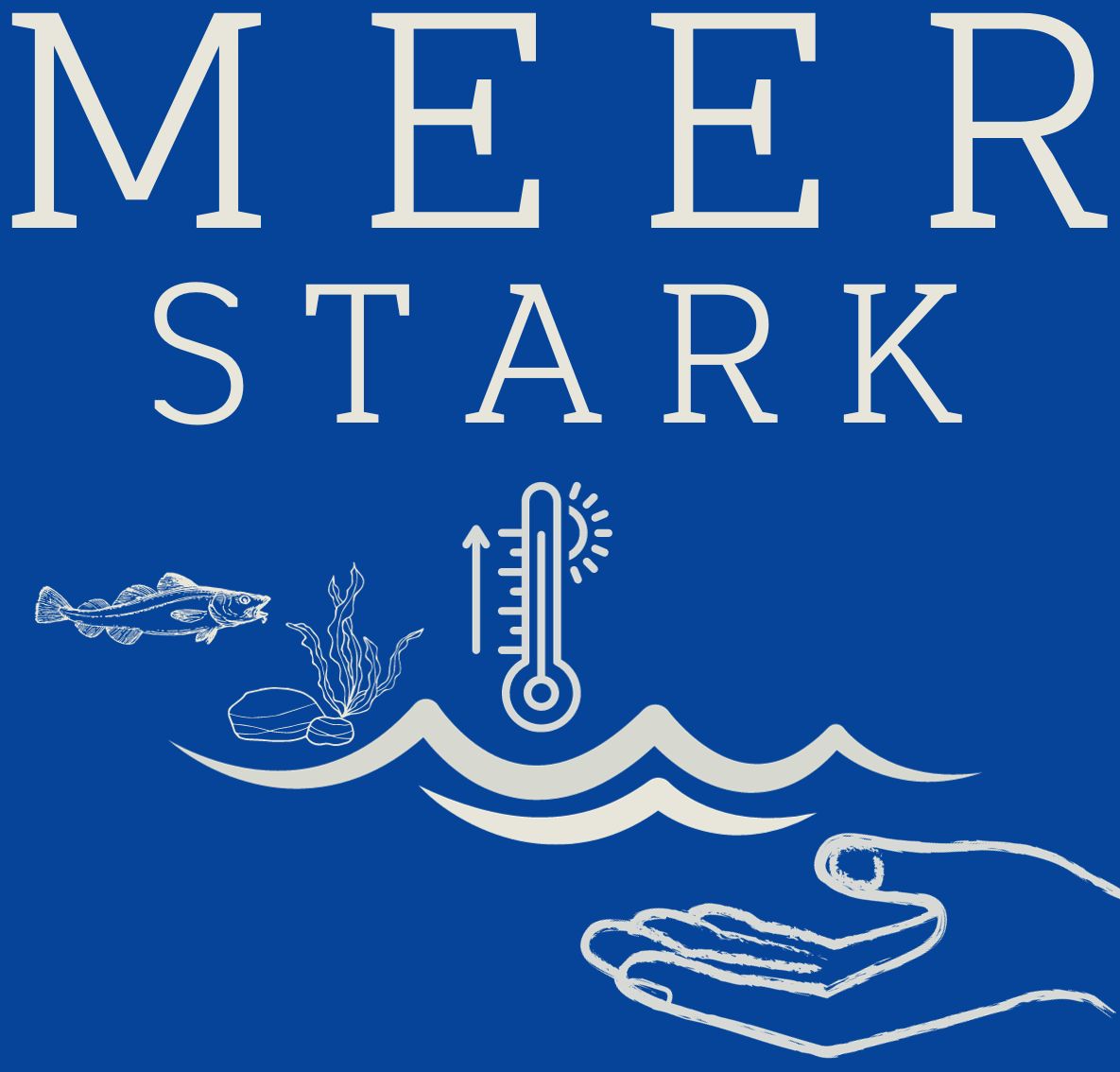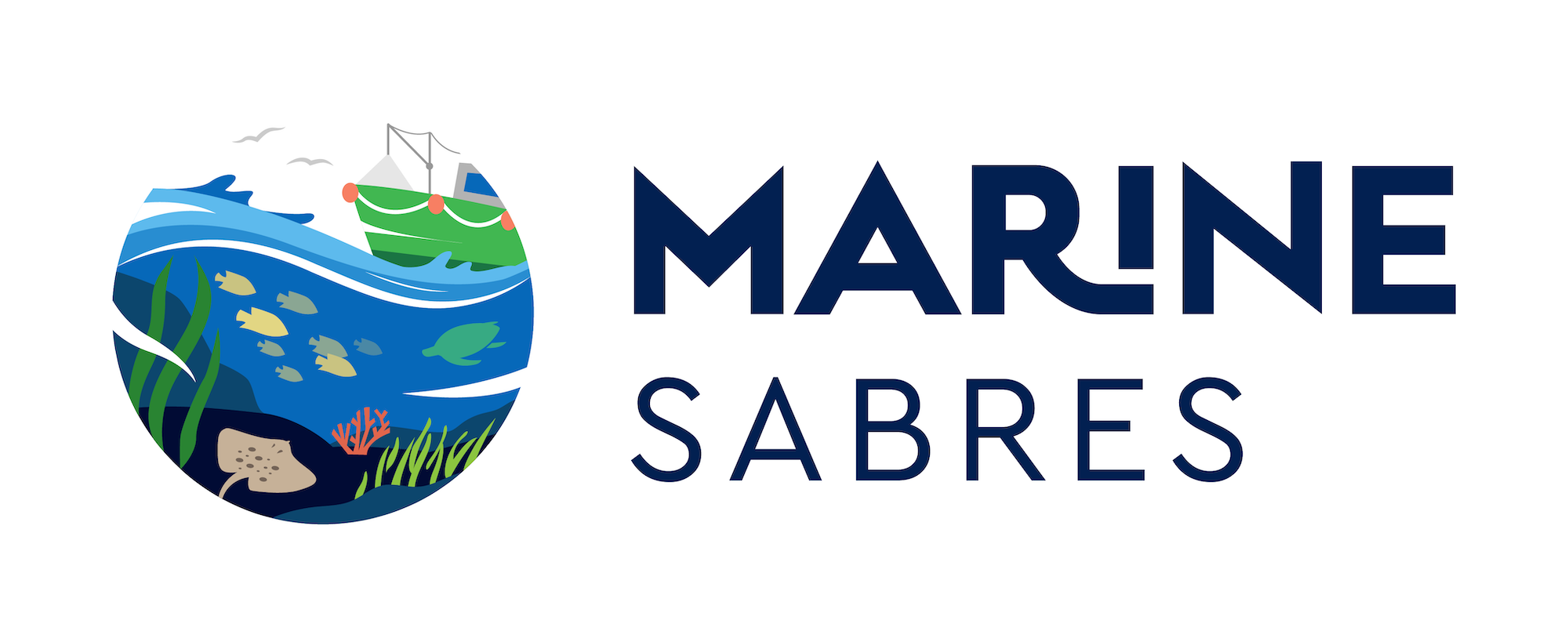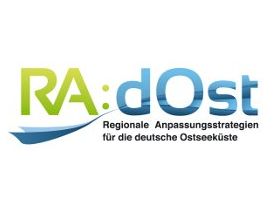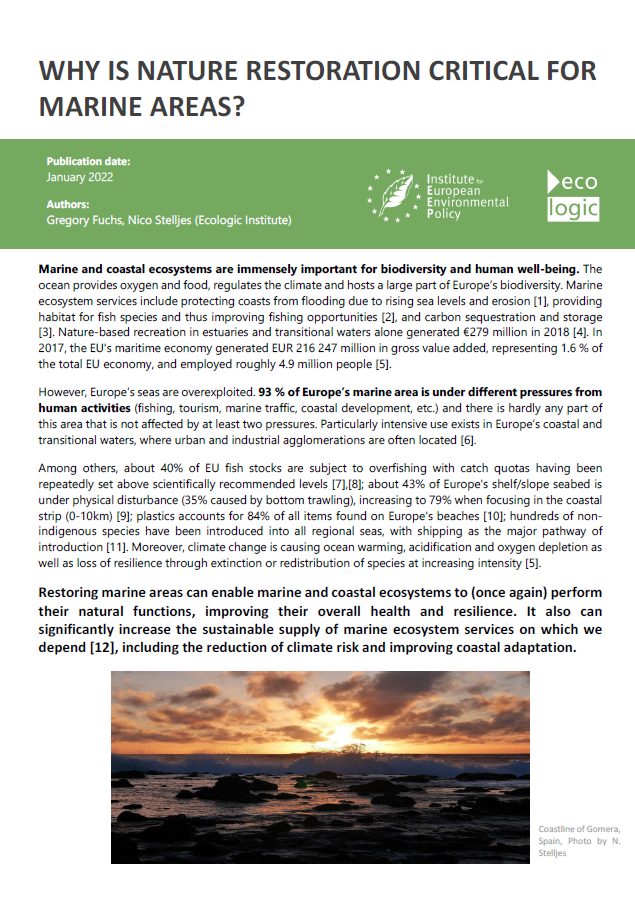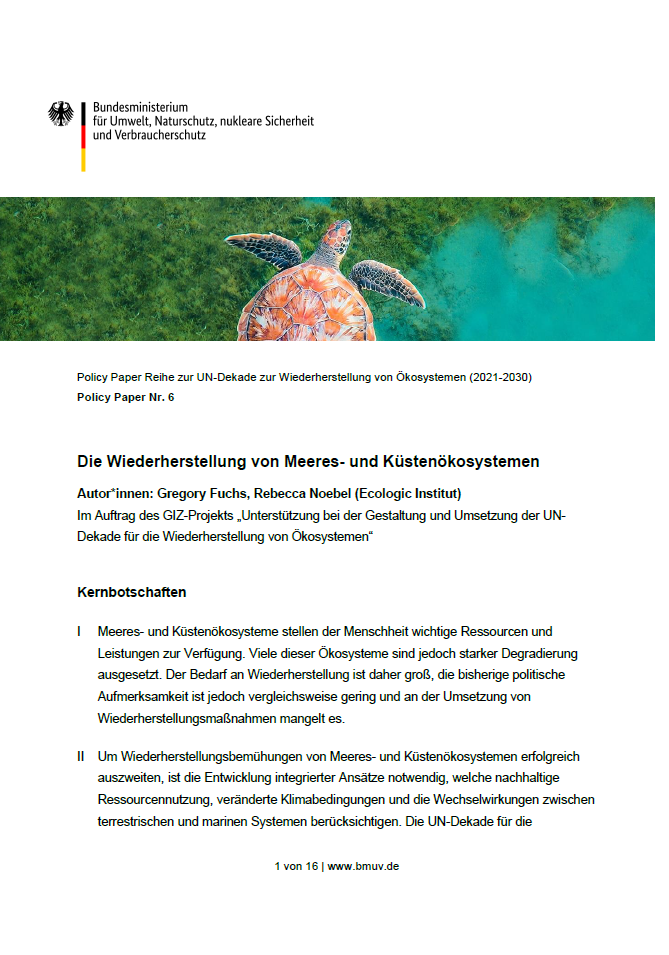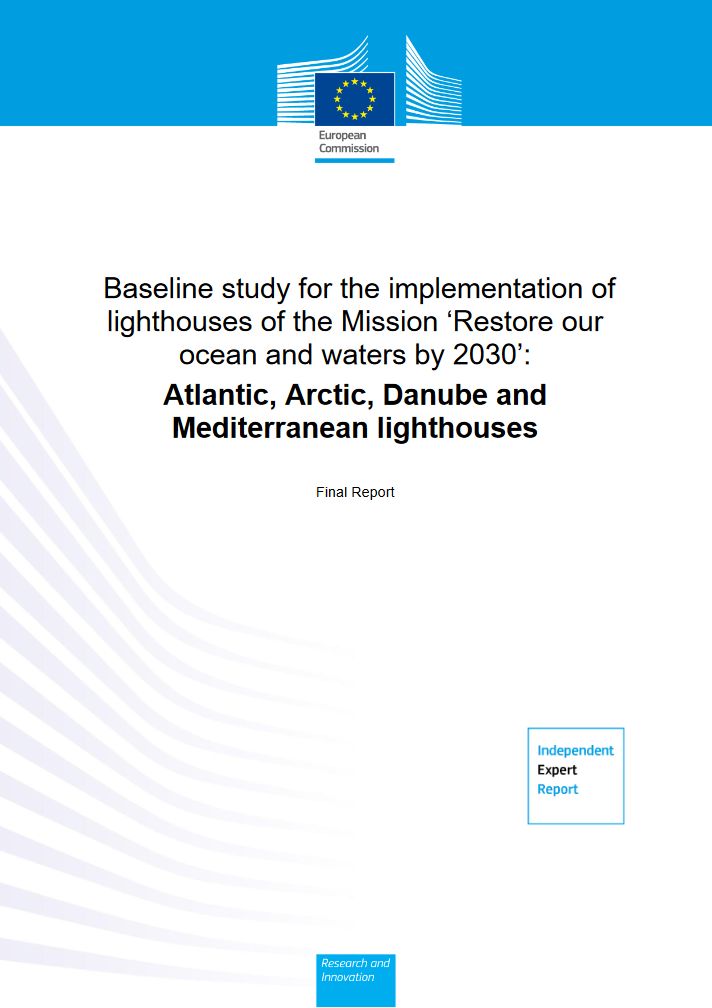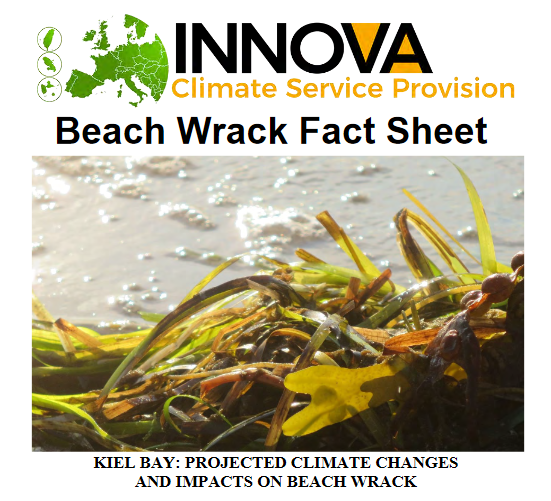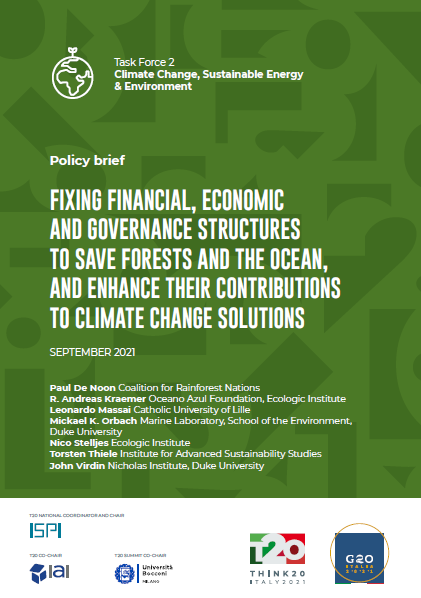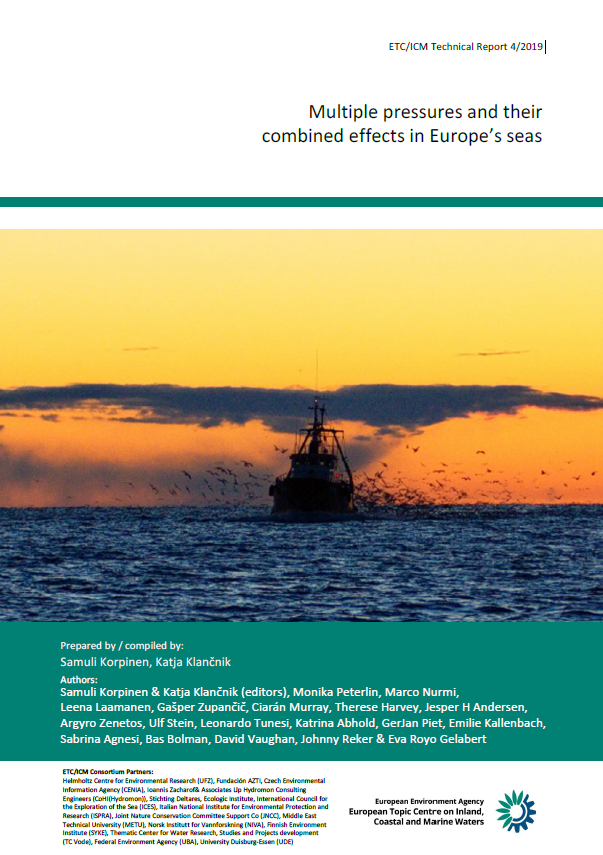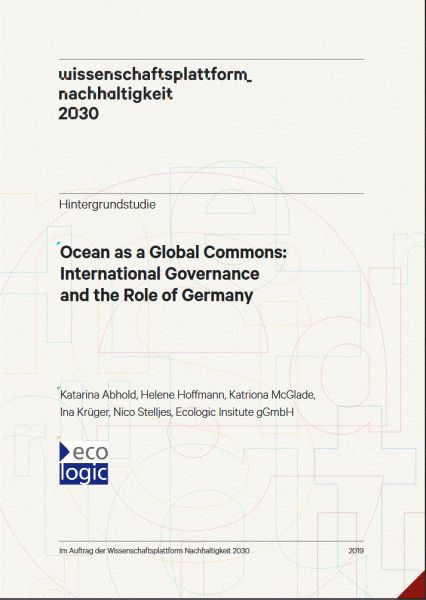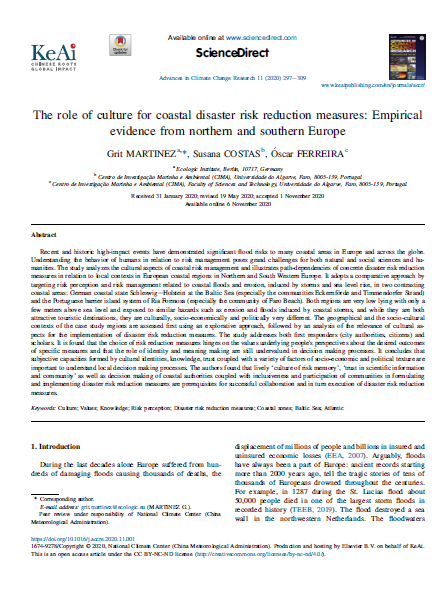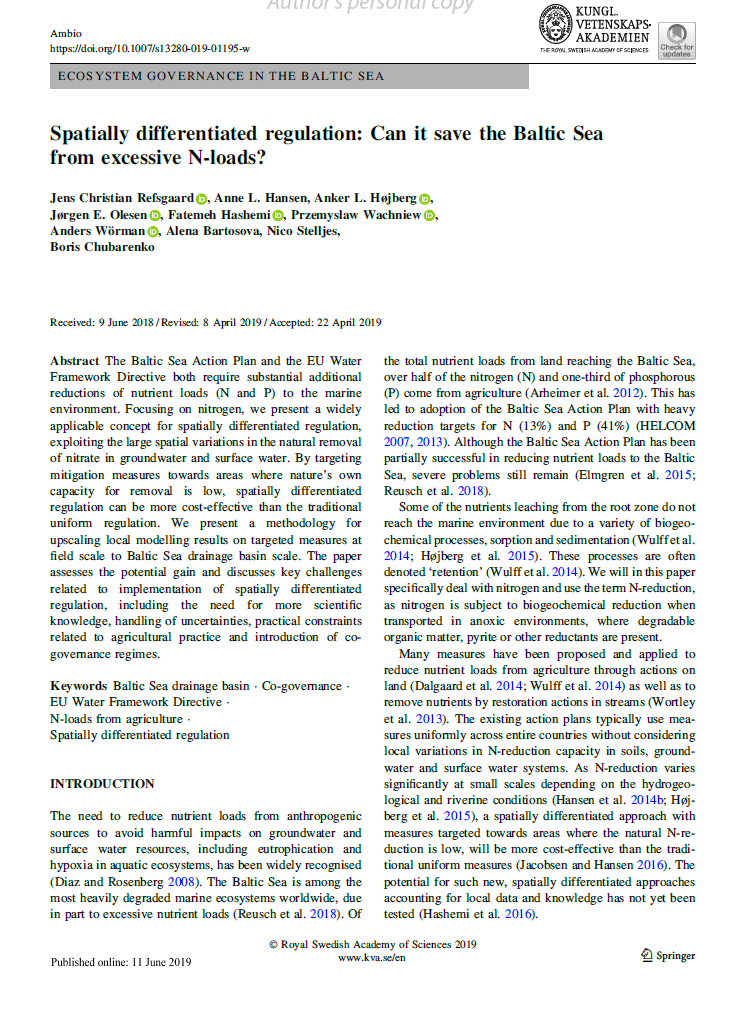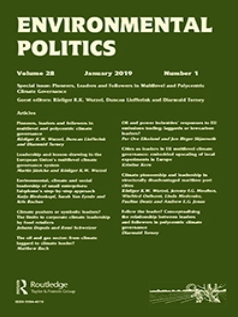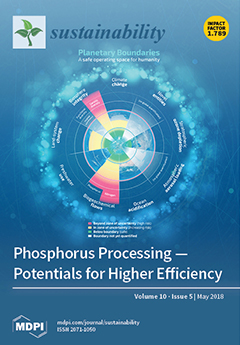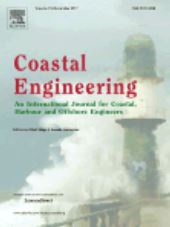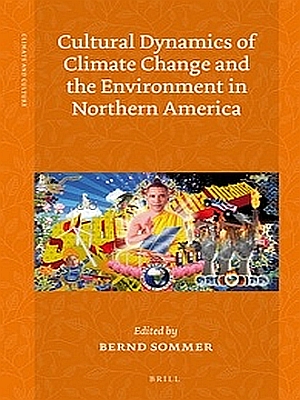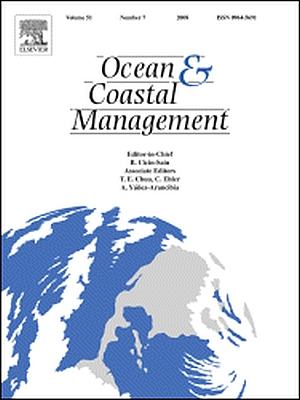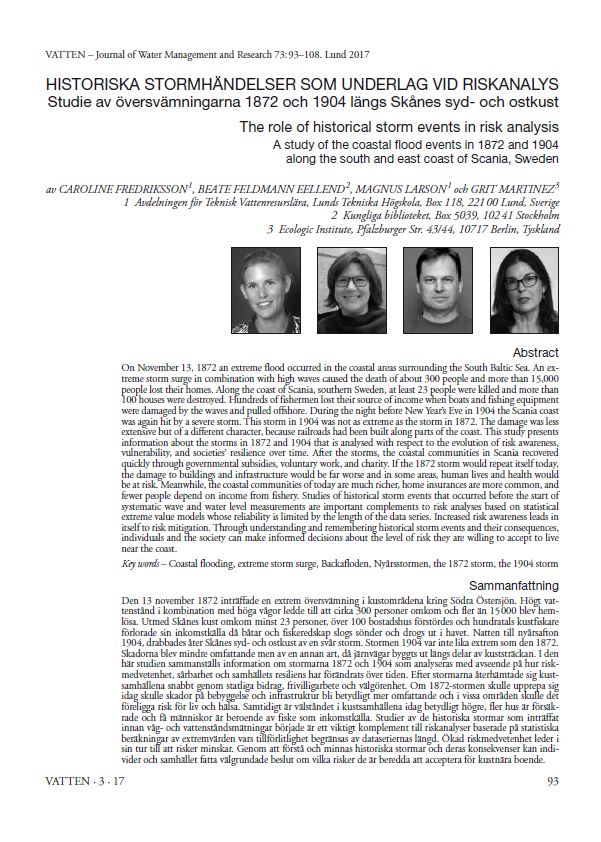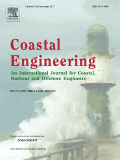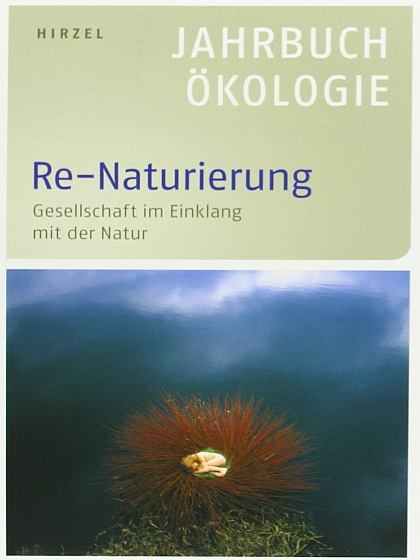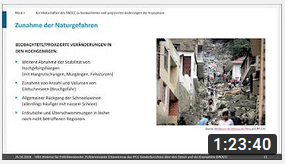Coastal + Marine
Oceans and coasts provide valuable natural resources and habitat to millions of people around the world. Over time, human uses increase pressure on these ecosystems. Existing policies and sectoral frameworks often struggle to balance human demand for ocean resources with ecological considerations. Frequently, ocean governance fails in ensuring resilience and in developing capacities to adapt to the effects of climate change.
Operating at the policy-science-society interface, Ecologic Institute's coastal and marine team addresses challenges to a healthy marine environment and the sustainable use of its resources. Issues like ocean governance, coastal adaptation and management, sustainable blue growth, or ocean plastic pollution are the cornerstone of our inter- and transdisciplinary research activities.
Not limited to, but with a focus on the Baltic and North Sea, Ecologic Institute's dedicated expertise lies in the analysis and implementation of marine and coastal policies and legislation. Co-creation and understanding stakeholders' needs – particularly in sociocultural, political, and economic contexts – are also inherent aspects of the practical transformation research. The interdisciplinary team provides research, analytical insights, and recommendations to help guide policy- and decision-makers at national, regional, European, and international levels towards more inclusive and integrated ocean and coastal management.
Contact
Related Topics
Selected Projects for Coastal + Marine
Ecosystem-based Adaptation for Coastal Regions Worldwide (TROPICAL ADAPT)
- Duration
-
-
- Funding
-
Federal Agency for Nature Conservation (BfN), Germany
Mission Ocean, Seas and Waters Implementation Support Platform
- Duration
-
-
- Funding
-
European Climate, Infrastructure and Environment Executive Agency (CINEA), International
The German North Sea and Baltic Sea over 100 Years Ago
- Duration
-
-
- Funding
-
Federal Agency for Nature Conservation (BfN), Germany
Economic Valuation of Marine Ecosystems and Environmental Pressures on the Oceans
- Duration
-
-
- Funding
-
German Environment Agency (UBA), Germany
Strengthening the Carbon Storage Potential of the North Sea and Baltic Sea
- Duration
-
-
- Funding
-
German Environment Agency (UBA), Germany
Implementing Legislation for the BBNJ Agreement
- Duration
-
-
- Funding
Marine Systems Approaches for Biodiversity Resilience and Ecosystem Sustainability (HEU Marine SABRES)
- Duration
-
-
- Funding
-
European Commission, Directorate-General Research & Innovation (DG Research & Innovation), International
Multi-use Offshore Platforms Demonstrators for Boosting Cost-effective and Eco-friendly Production in Sustainable Marine Activities (UNITED)
- Duration
-
-
- Funding
-
European Commission, Directorate-General Research & Innovation (DG Research & Innovation), International European Commission, Research Executive Agency (REA), International
Technological Options for Reducing Plastic Waste in the Oceans
- Duration
-
-
- Funding
-
Office of Technology Assessment at the German Bundestag (TAB), Germany
Blue Estuaries – Developing Estuaries as Habitable Sustainable Ecosystem Despite Climate Change and Stress (BluEs)
- Duration
-
-
- Funding
-
Federal Ministry of Education and Research (BMBF), Germany Projektträger Jülich, Forschungszentrum Jülich (PtJ), Germany
Greening the Blue Bioeconomy and Transition to Sustainable Fisheries and Aquaculture
- Duration
-
-
- Funding
-
European Environment Agency (EEA), International
Implementation of Lighthouses of Mission 'Restore our oceans and waters by 2030'
- Duration
-
-
- Funding
-
European Commission, Directorate-General Research & Innovation (DG Research & Innovation), International
Management Effectiveness of Marine Natura 2000 Sites and other EU Marine Protected Areas
- Duration
-
-
- Funding
-
European Commission, Directorate-General Environment (DG Environment), International
Implementation of the EU Marine Strategy Framework Directive (MEER project)
- Duration
-
-
- Funding
-
German Environment Agency (UBA), Germany
Pan-Arctic Network of Marine Protected Areas (Ark-MPA)
- Duration
-
-
- Funding
-
Federal Agency for Nature Conservation (BfN), Germany
Indicators of an Integrated German Marine Policy
- Duration
-
-
- Funding
-
Federal Ministry of Transport and Digital Infrastructure (BMVI), Germany
Internet Platform Marine Litter
- Duration
-
-
- Funding
-
German Environment Agency (UBA), Germany
The EU4Ocean Coalition for Ocean Literacy
- Duration
-
-
- Funding
-
European Commission Directorate-General for Maritime Affairs and Fisheries (DG Maritime Affairs and Fisherie), International
European Topic Centre on Inland, Coastal and Marine Waters (ETC-ICM)
- Duration
-
-
- Funding
-
European Environment Agency (EEA), International
Innovation in Climate Services Provision (INNOVA)
- Duration
-
-
- Funding
-
Federal Ministry of Education and Research (BMBF), Germany
"No more Plastics in the Oceans": Designing a legally binding global plastic convention
- Duration
-
-
- Funding
-
World Wide Fund For Nature (WWF), International
Knowledge, Assessment, and Management for Aquatic Biodiversity and Ecosystem Services Across EU Policies (AQUACROSS)
- Duration
-
-
- Funding
-
European Commission, Directorate-General Research & Innovation (DG Research & Innovation), International
Reducing Nutrient Loadings from Agricultural Soils to the Baltic Sea via Groundwater and Streams (Soils2Sea)
- Duration
-
-
- Funding
-
Federal Ministry of Education and Research (BMBF), Germany Baltic Organisations' Network for Funding Science EEIG (BONUS EEIG), Finland
Resilience-Increasing Strategies for Coasts – toolKIT (RISC-KIT)
- Duration
-
-
- Funding
-
European Commission, Directorate-General Research & Innovation (DG Research & Innovation), International
Regional Adaptation Strategies for the German Baltic Sea Coast (RADOST)
- Duration
-
-
- Funding
-
Federal Ministry of Education and Research (BMBF), Germany
Selected Publications for Coastal + Marine
Fuchs, Gregory; Stelljes, N. 2023: Why is nature restoration critical for marine areas?. IEEP, Ecologic Institute: Brussels, Berlin.
Fuchs, Gregory and Rebecca Noebel 2023: Die Wiederherstellung von Meeres- und Küstenökosystemen. Papier Nr. 6 der Policy Paper Reihe zur UN-Dekade für die Wiederherstellung von Ökosystemen (2021-2030). Federal Ministry for the Environment, Nature Conservation, Nuclear Safety and Consumer Protection, Berlin.
European Commission, Directorate-General for Research and Innovation, Alao Chanou, Z., McColgan, O., Berbel, J., et al., Baseline study for the implementation of lighthouses of the Mission 'Restore our ocean and waters by 2030': Atlantic, Arctic, Danube and Mediterranean lighthouses, Publications Office of the European Union, 2023, https://data.europa.eu/doi/10.2777/34856
Stelljes, Nico (2021): Using seagrass as insulation material. In: Baltic Stories Magazine, 2. Page 16-17. https://issuu.com/pomorskieregion/docs/baltic_stories_magazine_issue_2_…
Nico Stelljes (2021): INNOVA Beach Wrack Fact Sheet. Ecologic Institute. 10p.
Noon, Paul De; Andreas Kraemer; Leonardo Massai et. al 2021: Fixing Financial, Economic and Governance Structures to Save Forests and the Ocean, and Enhance Their Contributions to Climate Change Solutions. T20 Policy Brief TF2 – Climate Change, Sustainable Energy & Environment.
Stormfloden Sydfalster (Denmark) 13 november 1872
| Unknown authorUnknown author, Public domain, via Wikimedia CommonsHallin, Caroline, Jacobus L.A. Hofstede, Grit Martinez, Jürgen Jensen, Nina Baron, Thorsten Heimann, Aart Kroon, Arne Arns, Björn Almström, Per Sørensen, and Magnus Larson. 2021. "A Comparative Study of the Effects of the 1872 Storm and Coastal Flood Risk Management in Denmark, Germany, and Sweden" Water 13, no. 12: 1697. https://doi.org/10.3390/w13121697
Martinez G (2021) Coastal Risk Cultures: Local and Regional Formation of Knowledge and Action. Front. Environ. Sci. 9:578238. doi: 10.3389/fenvs.2021.578238
Korpinen, S., Klančnik, K., Peterlin, M., Nurmi, M., Laamanen, L., Zupančič, G., Murray, C., Harvey, T., Andersen, J.H., Zenetos, A., Stein, U., Tunesi, L., Abhold, K., Piet, G., Kallenbach, E., Agnesi, S., Bolman, B., Vaughan, D., Reker, J. & Royo Gelabert, E., 2019, Multiple pressures and their combined effects in Europe’s seas. ETC/ICM Technical Report 4/2019: European Topic Centre on Inland, Coastal and Marine waters, 164 pp.
Abhold, K., Hoffmann, H., McGlade, K., Krüger, I., Stelljes, N. (2019): Oceans as Global Commons. International Governance and the Role of Germany. Report to the Science Platform Sustainability 2030. Berlin: Ecologic Institute.
Martinez., G., Costas, S., Ferreira, O., The role of culture and informal aspects for coastal disaster risk reduction measures: Empirical evidence from northern and southern Europe, Advances in Climate Change Research 11(1), doi: 10.1016/j.accre.2020.11.001
Jens Christian Refsgaard, Anne L. Hansen, Anker L. Højberg, Jørgen E. Olesen, Fatemeh Hashemi, Przemyslaw Wachniew, Anders Wörman, Alena Bartosova, Nico Stelljes, Boris Chubarenko (2019): Spatially differentiated regulation: Can it save the Baltic Sea from excessive N-loads?. Ambio, https://doi.org/10.1007/s13280-019-01195-w
Wurzel, Rüdiger; Moulton, Jeremy; Osthorst, Winfried; Mederake, Linda; Deutz, Pauline; Jonas, Andrew (2019): Climate pioneership and leadership in structurally disadvantaged maritime port cities. Environmental Politics 28(1): 146-166.
Morten Graversgaard, Hedelin B., Smith L., Gertz F., Højberg A.L., Langford J., Martinez G., Mostert E., Ptak E., Peterson H., Stelljes N., van den Brink C., and Refsgaard J.C., Opportunities and Barriers for Water Co-Governance—A Critical Analysis of Seven Cases of Diffuse Water Pollution from Agriculture in Europe, Australia and North America. Sustainability 2018.10, 1634.
Martinez, G., Armaroli, C., Costas, S., Harley, D. M., Paolisso, M., (2018), Experiences and results from interdisciplinary collaboration: Utilizing qualitative information to formulate disaster risk reduction measures for coastal regions, Coastal Engineering, https://doi.org/10.1016/j.coastaleng.2017.09.010
Grit Martinez and Michael J. Paolisso 2015: "Cultural Dynamics of Adaptation to Climate Change: An Example from the East Coast of the US", in: Bernd Sommer (ed.): Cultural Dynamics of Climate Change and the Environment in Northern America. [Climate and Culture 3]. Leiden: Brill, 304-332.
Costas S., Ferreira ,O., Martinez, G., Why do we decide to live with risk at the coast? In: Ocean and Coastal Management, available online 30 May 2015, In Press.
Fredriksson; C., Feldmann Eellend, B., Larson; M., Martinez, G., The role of historical storm events in risk analysis. A study of the coastal flood events in 1872 and 1904 along the South and East Coast of Scania, Sweden, Vatten, Journal of Water Management and Research, pp 73:93 – 108, Lund 2017
Stelljes, N.; Martinez G.; McGlade, K. (2017). Introduction to the RISC-KIT Web Based Management Guide for DRR in European Coastal Zones. RISC-KIT Project.
Martinez, Grit and Mike K. Orbach 2014: "Küstenschutz – Europa und USA im Vergleich", in: Heike Leitschuh et al. (eds.): Jahrbuch Ökologie 2015. Re-Naturierung. Stuttgart: S. Hirzel Verlag, 214-222.
Selected Events for Coastal + Marine
Digital Event:Policy-relevant Findings from the IPCC Special Report on the Ocean and the Cryosphere in a Changing Climate (SROCC)
- Date
-
- Location
- online, Germany
Discussion:Soils2Sea: Reducing Nutrient Loadings Into the Baltic Sea – Film Premiere
- Date
-
- Location
- Mykanow, Poland
Workshop:Social Sciences and Humanities in Marine and Coastal Research
- Date
-
-
- Location
- Berlin, Germany
Conference:Sustainable Ecosystem Governance under Changing Climate and Land Use in the Baltic Sea Region – 3rd BONUS Symposium
- Date
-
-
- Location
- Gdansk, Poland
Discussion:Cultural Perceptions of Climate Change and Sea Level Rise Adaptation Strategies in Maryland, North Carolina, and the German Baltic Sea Coast
- Date
-
- Location
- Berlin, Germany
